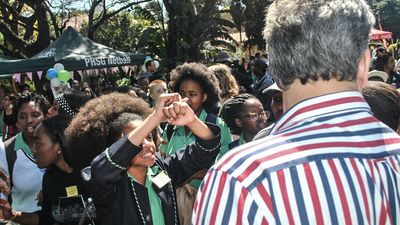Why Racist Hair Policies in South African Schools Go Beyond Just Hair
We're faced yet again, with black girl students being discriminated against because of their hair in South Africa.
Just when we thought that the national uproar that ensued after the protests at Pretoria Girls' High School last year was enough to send South African schools running to amend their hair policies, we're faced yet again, with black girl students being discriminated against because of their hair.
Many South Africans have been angered after a group of black girls were expelled from Windsor House Academy, a private school in Johannesburg, last week because their hair, according to the school principal, "looked like they were on school holidays rather than on school premises."
This is a narrative that resonates with me and so many other young black women in this country. When I was in high school, I was not allowed to have an afro or dreadlocks. I was also not allowed to have any hair extensions or even hair moisturizer in my hair. And when I tried to explain how difficult it was to maintain black hair or how damaging the chemical relaxers suggested to me were, I was waved away by a dismissive hand. What was worse was that as a head prefect, I had to order other girls to obey those very same hair policies. It was by far the most oppressive task that I had to carry out and it never really felt as if the issue was limited to just hair—probably because it wasn't.
#Racism [WATCH] Your braids are too messy' - Windsor House Academy learners kicked out of school by principal because of hair. #sabcnewspic.twitter.com/XzCm3Kdfo2
— Chriselda Lewis (@Chriseldalewis) July 25, 2017
It goes without saying that these hair policies are racist and the way in which black girl students are 'disciplined' is almost always humiliating and heavy-handed. These hair policies only ever apply to black girl students who are not, might I remind you, arriving at school with rainbow-coloured hair or crazy mohawks but instead with their hair either in their natural form or very often in braids or weaves that are neat, in an appropriate colour and tied up according to the school hair policies. In a country whose constitution espouses the need to embrace diversity, these schools are doing the exact opposite.
So no braids, no afros...what exactly are black pupils supposed to do with their hair???? 😤#WindsorHouseAcademy
— Melanie Webb (@MelanieWebbSA) July 26, 2017
Yes, the school environment is not a 'fashion parade' as many argue but the issue is not about black girl students wanting to flout school rules for the sake of looking trendy or fashionable but more about the conversation that schools are never willing to have—the fact that black hair has different maintenance needs to that of say white or coloured students and because of that reality, the hair policies needing to be reflective and accommodating of that.
Now while the Department of Education has responded swiftly and sought to nip this incident in the bud, it is unfortunately very difficult to police private schools and their policies in general because they often see themselves as being above reproach. And given the segregationist history of this country, the majority of private schools are still predominantly white and saddled with attitudes that are fundamentally unbending in terms of fully welcoming and embracing black people. This is where it becomes evident that these policies go beyond just hair. It speaks to the prevailing institutionalized racism that is still firmly entrenched in numerous spaces in this country—schooling structures being no exception. It speaks to why racism seems so much more magnified in universities and workplaces because it is largely ignored at primary and secondary school levels and not aggressively attacked for the societal cancer that it is.
That's not enough the entire colonial cultures of these institutions need to change. https://t.co/6lmZdJAqKx
— Busi Skinne Mjiyakho (@skinne_bee) July 26, 2017
#Racism These are the young black girls kicked out of Windsor House Academy because they braided their hair #sabcnewspic.twitter.com/jOaoazJGnD
— Chriselda Lewis (@Chriseldalewis) July 25, 2017
Yes, we need to address these racist hair policies. It is a matter of great urgency. These policies need to not only be amended but perhaps completely re-imagined in a way that seeks to prevent the current humiliation, vilification and oppression of young black students. However, I ardently believe that this re-imagining, if it is to be earnest, can only be done through questioning and challenging the entire ethos of a particular school, its culture and attitudes and having the difficult conversations through the appropriate forums about racism, prejudice and discrimination.
As uncomfortable as these conversations may be, they are necessary. They are not conversations to be tackled only by academics, university students, corporates or politicians, but all of South Africa—high school students and their management included.
- South African School Under Fire For Racist Classroom Activity - OkayAfrica ›
- President Cyril Ramaphosa Condemns Violence at Anti-Racism Protest - OkayAfrica ›
- Zulaikha Patel Celebrates Black Hair With New Book 'My Coily Crowny Hair' - OkayAfrica ›
- Malawian High Court Rules Dreadlocks Permitted in Schools - OkayAfrica ›
- A Rastafarian Girl Was Banned from School in Kenya Because of Her Locks - Okayplayer ›
